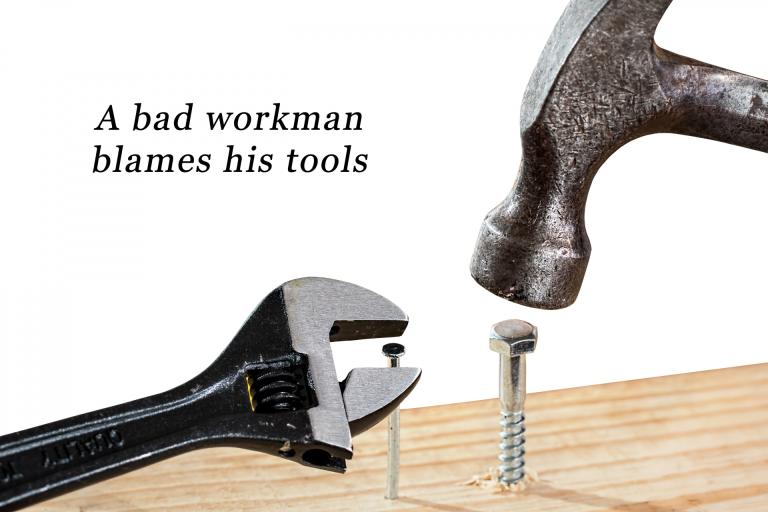I ask my students whether they’d like to know the secret to be a great pastor and teacher. “It’s very simple,” I hint. At this point, they usually grab their pens and lean in, wondering what bit of wisdom I’ll commend to them.
It’s short and straightforward, consisting of 3 words. Finally, I explain: You must be willing to say publicly, “I don’t know.” That’s more than half of what it takes. Why? Because any pastor or teacher who is willing to make it a habit to admit, “I don’t know” will likely have so many other parts of their character in the right state.
After exploring some relevant dynamics, I’ll suggest what I think fuels the anxiety about admitting ignorance and error.
“What if I’m wrong?”
There’s no shame in being wrong, but you would not know it by the way we act.[1]
We’ll resort to proud contentiousness, avoid certain people, and continue doing unwise things simply so we don’t have the face the truth: we’re wrong.
It’s so true that we could probably eliminate 90% of the conflicts in our lives if we would just be ok with admitting that we’ve made a mistake, we sinned, or just that we don’t have enough information.
Think of the countless times that some argument or heated debate came down to a misunderstanding or misaligned expectations. All the emotion and tension could have dissipated if we just said, “My mistake. I’m wrong.”
Various cultural phenomena have their roots in this allergy. Much of what goes by the name “deconstruction” stems from people’s frustration with church leaders who are unwilling to take a humble posture and admit being wrong or doing wrong. Political and social polarization is obviously compounded by this blindspot in our character.
We are afraid to even ask, “What if I’m wrong?” To pose the question feels like a threat. But why?
Why Such Irrationality?
Our unwillingness to admit mistakes or ignorance is utterly irrational. After all, we’re human. We’re not God. We have limitations. Heck, it’s a fundamental tenet of Christianity to believe that we’re all sinners. But it can feel like a fight to the death when two people begin arguing about who is wrong.
Besides the irrationality, there are numerous positive advantages to admitting error. It helps us to learn and grow as people. When you make a mistake, it’s an opportunity to reflect on what went wrong and to figure out how to avoid making the same mistake in the future. By acknowledging your mistakes and being open to learning from them, you can improve your skills and become a better person overall.
In addition, admitting that you’re wrong can build trust and credibility with others. If you are always trying to cover up your mistakes or blame others for them, who’s going to listen to you? People will ultimately lose confidence in our abilities and integrity.
On the other hand, if we’re willing to admit our mistakes and take responsibility for them, other people will see that we have integrity, love truth, and so are willing (even eager) to learn from our mistakes. This can help to build stronger relationships and create a positive reputation for yourself.
Finally, admitting that we’re wrong fosters a better group culture. When people can admit their mistakes without fear of retribution, it creates an environment where others feel safe to be open and honest with each other. This leads to better communication and collaboration, which eventually produces better outcomes and more successful results
Ashamed of What?
So, what are we afraid of? I suspect that shame is a major reason we fear admitting error and ignorance.
Shame focuses our attention on being rejected or cast aside. We fear being considered unworthy (by whatever measure our group uses). Being wrong cuts at a primal nerve. Admitting our mistakes or limitations conveys (so we feel) that we lack value.
This is why I think shame nourishes our anxiety, even though our fear is irrational. For all the reasons I’ve listed above, it’s as if we’re ashamed of being human. At times, we feel a disordered shame, as though we expect ourselves to be God!
So much shame comes from having wrong expectations about what it means to be human. If we get that one point right, we upend many of the deepest roots that feed our shame.
Application
With these thoughts in mind, read Matthew 7:1-4, not as a graceless edict but as a compassionate word to guard your heart.
“Do not judge, so that you may not be judged. For with the judgment you make you will be judged, and the measure you give will be the measure you get. Why do you see the speck in your neighbor’s eye, but do not notice the log in your own eye? Or how can you say to your neighbor, ‘Let me take the speck out of your eye,’ while the log is in your own eye? You hypocrite, first take the log out of your own eye, and then you will see clearly to take the speck out of your neighbor’s eye.”
Now ask yourself this question: What’s the last time you can remember specifically when you were wrong, have a bad motive, or sin?
Make yourself a goal this week. Proactively seek specific opportunities to tell someone you’re wrong, that you messed up and/or sinned. Don’t be general and vague. If you can’t think of something recently, perhaps you have a seared conscience. Yet, you can have freedom, a lightness of spirit available to you if only you would cast aside the fear and shame of being wrong.
[1] This post was inspired by Jim Mullins’ sermon at Redemption Tempe on Dec 18, 2022. Several ideas in this post come from Jim’s message.














